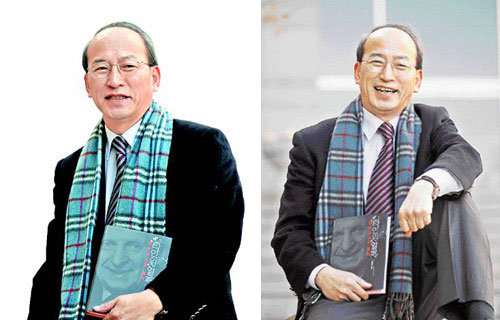Merry Philosophical Christmas
Merry Philosophical Christmas
Posted December. 20, 2005 08:23,

This Christmas marks the 10th anniversary of Levinas. He always preached on the core of our existence depending on others, and his anniversary is just like what German theologian Dietrich Bonhoeffer said: Isnt it meaningful that we are celebrating the coming of the Jesus who existed for others?
In Sogang University professor Kang Yeong-ahns (53, philosophy) book titled: The Face of Others, (Moonji Publishing) the world of philosophy that we are introduced to is French philosopher Emmanuel Levinas (1905-1995) warm and beautiful philosophy.
Kang was originally a linguist who majored in Dutch at the Hankuk University of Foreign Studies. He possessed remarkable linguistic skills, speaking 11 languages, including English, French, German, Dutch, Latin, Greek, and Sanskrit. But in 1974, he decided to devote his life to philosophy after reading an introductory piece on Levinas philosophy, written by professor in Dutch and dean of Dongduk Womens University Son Bong-ho for the first time in Korea.
Levinas criticized western philosophy as imperialistic because it turned all things into the subject of perception in emphasizing truth and identity. He preached, instead, of hospitality, which makes us humanely responsive to the pain of orphans, widows, strangers, and foreigners.
Kang left for the University of Louvain in Belgium at the recommendation of Son, and received his masters and doctorate, majoring in Kant philosophy before being initiated into the principles of Levinas philosophy. In stressing practical ethics instead of pure logic, Kant greatly influenced Levinas philosophy.
Levinas parents and siblings were all victims of the Holocaust. He was able to survive because he was an interpreter for the French military and POW at the time. Later on, he reminisced about his inhumane treatment at the POW camps and said that Nazisms last Kantians were the military dogs that barked in welcome after backbreaking work.
As Kant belatedly became a celebrity after he announced The Critique of Pure Reason at age 57, Levinas received the spotlight for his Holism and Infinitude at age 56 after being awarded his doctorate.
Levinas deepened Kants categorical imperative, saying, In any given situation, treat humans as the purpose, not the means. It is said that Kant believed that freedom comes before responsibility because we need to see if an act is the result of our free will in order to hold us responsible. On the contrary, Levinas says that only when the responsibility to listen to others pain overtakes our freedom does freedom have meaning. In this way, as postmodern philosophers who emphasized the death of the subject, they were differentiated from exposure and overthrow philosophers like Foucault, Deleuse, and Derrida.
Levinas philosophy illustrates the relationship between lovers, and parents and children very well.
Levinas explained that the reason women are attracted to men is because they symbolize otherness in the possibility of being hurt and the impossibility to fathom. Children help us overcome our mortality because they are others as me.
Levinas explains that our identity is not blank like Heidegger says, but becomes richer by helping neighbors, others, and people in pain. So justice is before truth. Dont you think that this is the real spirit of Christmas?
Chae-Hyun Kwon confetti@donga.com





![[사설]계엄 때보다 낮은 지지율 17%… 국힘의 존재 이유를 묻는 민심](https://dimg.donga.com/c/138/175/90/1/wps/NEWS/IMAGE/2026/02/26/133433702.1.jpg)

